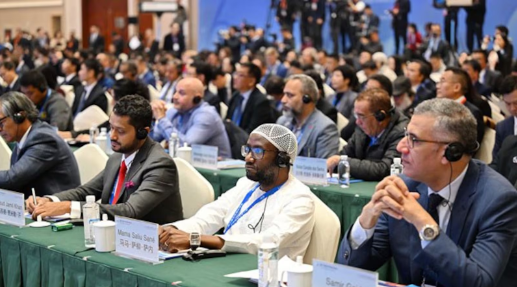China criticizes Western coverage of Uyghurs during a media forum.
China hosted a global media summit in Xinjiang this week, bringing together over 500 participants to discuss artificial intelligence, but also used the event to criticize Western reports about the forced labor of Uyghurs and an ongoing genocide were “fabricated lies.”
Representatives from over 200 media outlets — including executives from Reuters and The Associated Press — government agencies and international organizations attended the 6th World Media Summit, which opened Monday in Urumqi, Xinjiang’s capital, to discuss how artificial intelligence, or AI, is transforming the media industry.
The summit was organized by China’s official Xinhua News Agency and the Xinjiang regional government.
In addition to speeches about AI, Chinese officials blasted Western news reports that have shed light on the oppression of the 12 million Uyghurs who live in Xinjiang, or East Turkistan, as Uyghurs prefer to call it.
The United States and some Western parliaments have said there is credible evidence that China’s treatment of the Uyghurs is a “genocide” and “crimes against humanity.” The U.S. Congress has also passed a law banning the import of goods and materials suspected of being made by Uyghur forced labor.
But Ma Xingrui, Communist Party secretary of the Xinjiang Uyghur Autonomous Region, rejected the accusations, saying all ethnic groups in the region live peacefully.
“Some anti-China forces in the world have disregarded the facts, wantonly fabricated lies such as ‘genocide’ and ‘forced labor’ in Xinjiang, China, and maliciously imposed unilateral sanctions,” he said in a speech, according to a post on the Xinjiang government website.
“At present, Xinjiang has a stable society, a prosperous economy, and people of all ethnic groups live and work in peace and contentment, and the development situation continues to improve,” he continued.
Amplifying a narrative
Ma’s comments are an example of how China is amplifying its own narrative about the Uyghurs living happily and enjoying prosperity despite evidence to the contrary, including many stories by Radio Free Asia.
China does not permit journalists to travel freely in Xinjiang and convincing Uyghurs contacted by phone to talk to reporters outside the country puts them at considerable risk of punishment.
Representatives from Al Jazeera, Russian news agency TASS, the Malaysian National News Agency, the Kyrgyz State News Agency, South Africa’s Independent Media, Hungary’s ATV and media organizations from China-friendly countries also attended the event.
“Their fundamental purpose is to drag the people of all ethnic groups in Xinjiang into poverty and backwardness, and then realize the plot of ‘using Xinjiang to control China,’” Ma said, according to comments from the speech published in Chinese by the Xinjiang government.
The report went on to make comments that weren’t clearly attributed to any one person, saying, “Everyone appreciates China’s Xinjiang’s remarkable achievements in various fields and fully recognizes Xinjiang’s important contributions to regional social stability, economic development and cultural prosperity.
It said that “China’s Xinjiang has repeatedly been the target of false propaganda and malicious attacks. But it turns out that the narrative about human rights violations in Xinjiang is based on false information and is purely for political purposes.”
Harnessing AI
Also, it comes as no surprise that China is interested in harnessing the power of AI — the theme of the conference — to spread its narratives, said Henryk Szadziewski, research director at the Uyghur Human Rights Project in Washington.
“Urumqi is, of course, a strategic place because the Uyghur region is one of the leading spaces in China where China is spreading disinformation about conditions on the ground,” he told RFA. “It’s a leading part in China’s messaging to the globe.”
China’s efforts to promote its narrative appears to be paying off.
Bassam Zakarneh, a member of Fatah’s Revolutionary Council of Palestine, who led a delegation of Palestinian and other Arab politicians on a visit to Xinjiang in March, told Xinhua in an interview on Monday that the West was “trying to exploit anything to undermine China’s progress and development” through a smear campaign against Beijing’s Xinjiang policy.
“Our visit and observation on the ground were proof that Western propaganda is false,” he said.













